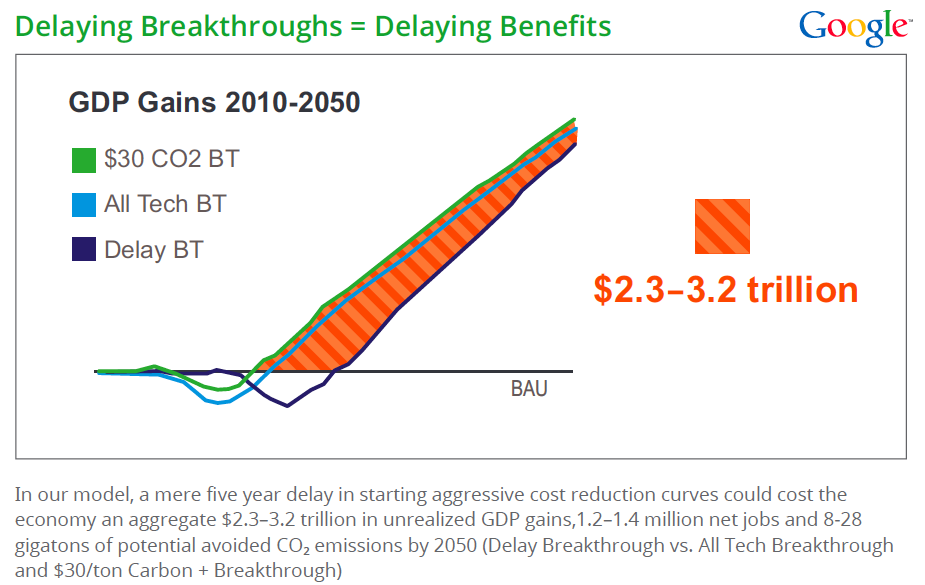
Google recently released a report detailing the results of their study modeling the impact of breakthroughs in key energy sectors: clean power, energy storage, electric vehicles, and natural gas, along with combinations of clean energy policies.
In order to perform these economic assessments, Google used a carbon economics tool created by McKinsey:
"This analysis was prepared by Google.org using McKinsey & Company's US Low Carbon Economics Tool, which is a neutral, analytic set of interlinked models that estimates potential economic implications of various policies using assumptions defined by Google.org"
In true Google fashion, they also put together a very useful and easy to navigate website detailing the key results of the study, and highlighting some of the key figures in the report. For example:
In this figure, "BT" is a breakthrough, which Google defines as green technologies meeting a certain cost/performance level. You can read about the various "BTs" here. "BAU" is business as usual. The green line depicts a scenario in which we price carbon emissions from the power sector at $30 per ton (which is used to fund a cut in corporate and individual income tax rates), and in which we invest strongly in green technology. The blue line depicts green tech investment without a carbon price. The purple line depicts a scenario in which we delay strong investment in green tech for 5 years. The orange and red area shows the difference in US gross domestic product (GDP) between the green and purple scenarios: we lose a total of $2.3 to 3.2 trillion in benefits over the next 40 years.
Some other key findings in the report:
"Our modeling indicates that, when compared to BAU in 2030, aggressive energy innovation alone could have enormous potential to simultaneously:
- Grow the US economy by over $155 billion in GDP/year ($244 billion with Clean Policy)
- Create over 1.1 million new net jobs (1.9 million with Clean Policy)
- Save US consumers over $942/household/year ($995 with Clean Policy)
- Reduce US oil consumption by over 1.1 billion barrels/year
- Reduce US total greenhouse gas emissions (GHG) by 13% (21% with Clean Policy)
By 2050, innovation in the modeled technologies alone reduced GHG emissions 55% and 63% when combined with policy, while continuing positive economic and job growth. This analysis indicates that aggressive clean energy innovation could simultaneously help address the US’ major long-term economic, environmental, and security goals."
In short, investing in green tech alone is highly beneficial for the economy and employment, and even moreso if 'Clean Policy' and/or a price on carbon emissions are implemented. Google defines what they mean by 'Clean Policy':
"a collection of existing or proposed federal policies including a Clean Energy Standard (25% [carbon capture and storage], renewables, and new nuclear by 2030), Energy Efficiency Resource Standard (EERS), increased Corporate Average Fuel Economy (CAFE), increased EPA regulations on coal, extended Investment and Production Tax Credits, and a Loan Guarantee credit facility capped at $15 billion per year."
Interestingly, contrary to popular opinion, the Google study finds increased EPA regulations economically beneficial. Also contrary to certain public opinion, in addition to increasing GDP, and reducing oil consumption and CO2 emissions, investing in green tech and implementing Clean Policy and/or carbon pricing will lead to a decrease in household energy bills:
The results are even better when a price on carbon emissions is implemented, which supports our arguments that CO2 limits are good for the economy:
The bulk of the reduction in energy bills (74%, or $699 per year on average) is attributed to the transition to electric vehicles (electricity bills go up, but fuel costs decrease by substantially more). The transition to electric vehicles also accounts for half of the projected job creation. As noted in the first figure above, Google emphasizes that "speed matters":
"In our model, a mere five year delay in starting aggressive cost reduction curves could cost the economy an aggregate $2.3–3.2 trillion in unrealized GDP gains, 1.2–1.4 million net jobs and 8-28 gigatons of potential avoided CO2 emissions by 2050"
The lesson to be learned here is that investment in green tech, clean policy, and carbon pricing are beneficial to the economy. Delaying implementation of these mechanism could potentially cost us a lot of money. The funds for investment in green technology have to come from somewhere, and a carbon emissions price can provide those funds, as has happened in the Regional Greenhouse Gas Initiative.
As Google puts it:
"The benefits are clear, so let’s go!"
For further details on this report click the links above. Or Google it!
NOTE: the results of this study have been added to the rebuttal to "CO2 limits will harm the economy"
Posted by dana1981 on Saturday, 2 July, 2011
 |
The Skeptical Science website by Skeptical Science is licensed under a Creative Commons Attribution 3.0 Unported License. |